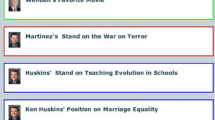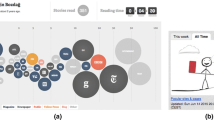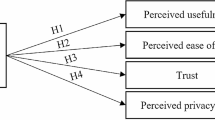Abstract
By integrating what is known about how people navigate the overwhelming tide of political information with research on usability, the experiments reported in this article aim to provide information about how to create political websites that are usable, engaging, and educational. This article reports on a series of four different experiments (n=478) comparing a simpler and more easily navigable website to a more complex and interactive website. The types of websites tested include: adwatches, issue grids, candidate biographies, and campaign finance sites. The results suggest that simpler, more navigable websites are preferred to more interactive websites with web tools. Results also suggest that more political information is not always preferable, as in most cases, participants rated sites with more political information lower.
Similar content being viewed by others
References
Agarwal, R. & Venkatesh, V. (2002). Assessing a firm’s web presence: A heuristic evaluation procedure for the measurement of usability. Information Systems Research, 13. 168–186.
Cornfield, M., Rainie, L., & Horrigan, J. B. (2003, March 21). Untuned keyboards: Online campaigners, citizens, and portals in the 2002 elections. Report prepared for the Pew Internet and American Life Project and the Institute for Politics, Democracy and the Internet. Retrieved July 27, 2004, from http://www.pewinternet.org/reports/pdfs/PIP_IPDI_Politics_Report.pdf.
Gray, W. & Salzman, M. (1998). Damaged Merchandise? A review of experiments that compare usability evaluations methods. Human-Computer Interaction, 13. 203–261.
Huang, L. & Price, V. (2001). Motivations, goals, information search, and memory about political candidates. Political Psychology, 22(4). 665–692.
Internet politicking: You’ve got e-mail. (2003, March 21). The Hotline. Retrieved July 14, 2004 from Factiva.
Jamieson, K. H. (1992). Dirty Politics: Deception, Distraction, and Democracy. New York: Oxford University Press.
Johnson, T. J., & Kaye, B. K. (1998). The Internet: Vehicle for engagement or a haven for the disaffected? In T. J. Johnson, C. E. Hays, & S. P. Hays (Eds.), Engaging the Public: How the Government and Media can Reinvigorate American Democracy (pp. 123–135). Lanham, MD: Rowman & Littlefield.
Kaye, B. K. & Johnson, T.J. (2002). Online and in the know: Uses and gratifications of the web for political information. Journal of Broadcasting & Electronic Media, 46. 54–76.
Kohut, A., Rainie, L., Doherty, C., Parker, K., Flemming, G., Dimock, M., Samaranayake, N. (2000, December 3). Youth vote influenced by online information: Internet election news audience seeks convenience, familiar names. Report prepared for the Pew Research Center for The People & The Press and Pew Internet and American Life Project. Retrieved July 12, 2004, from http://www.pewinternet.org/pdfs/PRC_Politics_Report.pdf.
Nielsen, J. (1999). Designing Web Usability: The Practice of Simplicity. New York: New Riders.
Nielsen, J. (2001, January 21). Usability Metrics. Retrieved July 23, 2004, from http://www.useit.com/alertbox/.
Palmer, J. (2002). Designing for website usability. Computer, 35(7). 102.
Shneiderman, B. (1998). Designing the User Interface: Strategies for Effective Human-Computer Interaction. Addison-Wesley: Reading, MA.
Author information
Authors and Affiliations
Additional information
Brett A. Mueller received a master’s degree from the Annenberg School for Communication in 2002. This research is supported by a grant from The Pew Charitable Trusts; Dr. Kathleen Hall Jamieson, Primary Investigator. The authors than Joyce Garczynski, Jon Stromer-Galley, Svjetlana Tepavcevic, and Dannagal Goldthwaite Young for their work on the project.
Rights and permissions
About this article
Cite this article
Tisinger, R., Stroud, N., Meltzer, K. et al. Creating political websites: Balancing complexity & usability. Know Techn Pol 18, 41–51 (2005). https://doi.org/10.1007/s12130-005-1024-9
Issue Date:
DOI: https://doi.org/10.1007/s12130-005-1024-9




